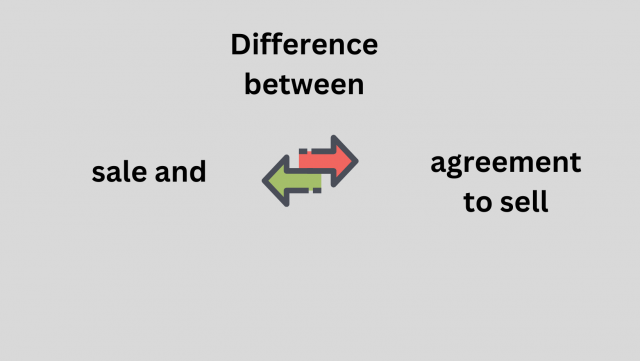Are you considering purchasing or selling a property in the real estate market? If so, it’s important to understand the basic vocabulary that forms the basis of any industry transaction. The terms “Sale” and “Agreement to Sell” frequently appear in property transactions.
Both entail the exchange of property for a set price, but they have different legal ramifications. We’ll examine the difference between Sale and Agreement to Sell in this blog and translate them into plain, understandable English so you may handle real estate deals with assurance.
Grasping the Fundamentals
Buy: Starting with the easier of the two, we have a “Sale.” A full transaction is a sale. Upon meeting the terms specified in the agreement, you immediately become the property owner when you enter into a transaction.
It’s similar to buying an existing house from its owner: after you pay the sum, you own the house and all its associated rights and obligations.
Contract for Sale: We will proceed to the “Agreement to Sell.” This is a little more complex. In essence, you commit to selling your home at a given future date and under a given set of terms when you agree to sell.
You are still the owner of the property until these requirements are satisfied. It resembles a promise to sell your house after a set of circumstances or occurrences, such as getting the necessary approvals or your buyer getting bank financing.
Also Read: Tips to buy property online
Important Differences
Let’s examine the difference between Sale and Agreement to Sell in more detail:
- Transferring Ownership: In a transaction, the buyer receives ownership right away. On the other hand, in a sale agreement, ownership is agreed to be transferred only after the terms of the agreement are fulfilled.
- Character of the Agreement: A sale is a simple, instantaneous transfer of ownership. A sale agreement is contingent upon certain future occurrences or circumstances.
- Title Transfer: Upon contract execution in a sale, ownership of the goods passes to the buyer. In a sale agreement, the seller retains title until the prearranged future date.
- Transfer of Risk: As soon as the money is paid, the buyer assumes all risk related to the property when you enter into a sale. As opposed to this, in a sale agreement, the seller bears the risk until the terms of the agreement are satisfied.
- Right to Sell: Upon the execution of a transaction, the seller gives up the right to sell the property to a third party. If the first bidder in a sale agreement doesn’t fulfill their end of the bargain, the seller can look into other buyers.
- Sales tax is a common expense associated with sales. However, depending on the agreement’s jurisdiction and conditions, the taxation picture for a sale agreement may change.
- Damage Responsibility: Following the transfer of ownership, the buyer in a transaction is in charge of any damages to the property. Since ownership remains with the seller in a sale agreement, the seller may still be liable for losses or damages.
Joining the Dots: Sale vs. Agreement to Sell
Let’s now make the connection between a “Contract of Sale” and an “Agreement to Sell”:
- An executory contract, such as an agreement to sell, indicates that ownership will not pass until certain future events or conditions are satisfied.
- A contract of sale, however, entails an instantaneous transfer of ownership upon execution.
- To further clarify this distinction:
Scenario 1: You consent to sell a buyer your property, provided that the buyer obtains a bank loan within a given time frame. It is still an agreement to sell until this requirement is satisfied.
Scenario 2: You promptly transfer ownership of your property to the buyer after agreeing on a price. This is an example of a sales contract.
The Sale Deed’s Essential Role
We have examined the two main ideas—sale and agreement to sell—and comprehended the significance of a sales contract. This brings us to the next crucial component of real estate deals: the “Sale Deed.”
A Bill of Sale: This document is executed once all the terms specified in the sale agreement or contract have been settled expressly. It documents the transaction and the buyer’s property acquisition from the seller. After completion, the selling deed must be legally recorded at the registrar’s office.
Breaking down the Sale Deed
Generally, a sale deed contains the following essential details:
- Specifics about the Parties: It names the buyer and seller, the parties to the transaction.
- Property Overview: The property is described in great detail in the deed, so there is no doubt as to what is being transferred.
- Title Transfer: This section describes how the buyer and seller exchange property titles.
- Consideration Value: References to the contract of sale or agreement to sell are made, together with the agreed-upon value for the transaction.
- Rights and Interests: The deed outlines how the new owner will get certain rights, interests, and property claims.
- Easements and Privileges: This contains details regarding the new owner’s ability to utilize the property’s amenities, easements, and privileges.
Taking Care of Cancellations and Conflicts
selling agreement cancellation is possible if any party breaches the terms and conditions outlined in the selling agreement. It might be necessary for the non-compliant party to make good on lost revenue by way of damages. Should there be disagreements regarding the settlement, they may turn into a legal issue.
Revocation of the Sale Deed: A more involved legal process is involved in canceling a sale deed. It necessitates applying legislative measures like Sections 31 to 33 of the Specific Relief Act 1963 as well as a solid foundation for concern. This is not the same simple process as terminating a sale agreement.
What a Sale Agreement Is For
It is not required but strongly advised to prepare a sale agreement before signing a sale deed. A selling agreement helps to prevent conflicts of interest by serving as a safeguard for both the seller and the buyer. Based on the agreement paperwork, banks may occasionally additionally offer home loans. For all parties concerned, this agreement minimizes risks and guarantees openness.
Conclusion
It is essential to understand the basics of difference between Sale and Agreement to Sell, contracts of sale, sale documents, and sales agreements to make wise choices in the real estate market. These ideas have wide-ranging effects on everything from taxes and risk management to property ownership and rights.
Therefore, recognize the significance of these ideas whether you’re a seller seeking to close a deal or an investor seeking to purchase a property. At Propex, we respect your real estate background and work to arm you with the information you need to negotiate this changing market successfully. With these insights, you’ll be more prepared to start your real estate journey and make wise decisions.
Frequently Asked Questions
what is sale and agreement to sell?
what is the difference agreement to sell and sale deed?
How do you prove a agreement to sell?
What is the validity period of agreement to sell?
When an agreement to sell becomes a sale?





